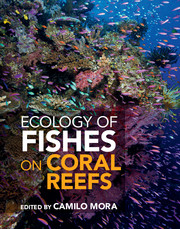Book contents
- Frontmatter
- Contents
- Preface
- Foreword
- List of contributors
- PART I BASIC ECOLOGY
- PART II PATTERNS AND PROCESSES
- PART III HUMAN FINGERPRINTS
- PART IV CONSERVATION
- 18 Resilience in reef fish communities
- 19 Phase shifts and coral reef fishes
- 20 Extinction risk in reef fishes
- 21 A perspective on the management of coral reef fisheries
- 22 Linkages between social systems and coral reefs
- PART V DEBATES AND PARADIGM SHIFTS
- References
- Index
22 - Linkages between social systems and coral reefs
from PART IV - CONSERVATION
Published online by Cambridge University Press: 05 May 2015
- Frontmatter
- Contents
- Preface
- Foreword
- List of contributors
- PART I BASIC ECOLOGY
- PART II PATTERNS AND PROCESSES
- PART III HUMAN FINGERPRINTS
- PART IV CONSERVATION
- 18 Resilience in reef fish communities
- 19 Phase shifts and coral reef fishes
- 20 Extinction risk in reef fishes
- 21 A perspective on the management of coral reef fisheries
- 22 Linkages between social systems and coral reefs
- PART V DEBATES AND PARADIGM SHIFTS
- References
- Index
Summary
In this chapter, we synthesize empirical and theoretical research from a range of fields to explore key social–ecological interactions in coral reefs. First, we systematically review the current status of research on human interactions with coral reefs to better understand where current research is directed, and where it is lacking. Second, we provide a framework for better understanding the complex interactions between people and reefs. Finally, we highlight opportunities for moving beyond research that merely demonstrates human impacts on reefs and toward innovative solutions space that can enhance human benefits while preserving the ecological integrity of coral reefs.
Among many scientists and managers there has been a pervasive assumption that human society is somehow separate from reefs. Yet, with the exception of a few extremely remote locations, most coral reefs are complex peopled seascapes [491,2306] that are increasingly being characterized as linked or coupled “social–ecological systems” (SESs) [1194]. The SES concept is based on the recognition that the delineation between ecosystems and society is arbitrary; they are instead intricately connected [231,233]. Anthropogenic actions alter the structure and function of ecosystems, just as resource pools and ecosystem services can help define the well-being of coastal societies (Figure 22.1). Understanding key social–ecological linkages can help to better define not only the problems affecting coral reefs, but also the solutions necessary to sustain them.
In this chapter, we examine the state of the literature on coral reef SESs and provide a framework to help guide future research. We first assess the literature, reviewing studies that have quantified how coral reefs have been impacted by different types of human activities and socioeconomic conditions. Central to the conceptual organization of our review is the social science concept of proximate (or sometimes referred to as proximal) and distal (or sometimes called ultimate) drivers.
Proximate drivers are those that directly impact coral reefs. These can include impacts such as overfishing, land-based pollution, introduction of invasive species, climate change, and other threats.
- Type
- Chapter
- Information
- Ecology of Fishes on Coral Reefs , pp. 215 - 220Publisher: Cambridge University PressPrint publication year: 2015
- 8
- Cited by



